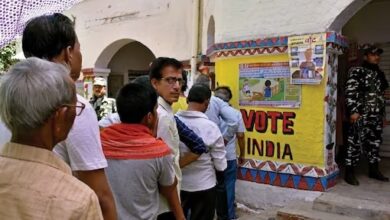The JD(S)’s coalition with the BJP in Karnataka suggests a change in approach toward Muslim voters
Several Muslim officials have left the Janata Dal (Secular), signaling a change in the party’s strategy towards its Muslim voting base in the state, according to political observers, as the JD(S) seeks an alliance with the Bharatiya Janata Party (BJP) for the 2024 Lok Sabha elections. However, observers warned, the coalition is probably going to give the BJP the upper hand in the long term.
Senior Muslim officials, including Syed Shafiullah, the party’s senior state vice-president, resigned from all party posts a day after the JD(S) joined the BJP-led NDA. More Muslim leaders are reportedly considering taking a similar step and have opted to confer with their district counterparts before taking any further action.
While the JD(S) is currently competing for the Vokkaliga vote bank after its strategy of gaining Muslim votes in the most recent Assembly elections flopped, both the BJP and the JD(S) aim to profit from the partnership. While nine out of the 15 Muslim candidates the Congress fielded were victorious, none of the 22 candidates the JD(S) fielded did.
“The Muslim votes in the 2023 Assembly elections primarily supported the Congress. The survey results support this as well. The JD(S) claims that because the Muslim vote is already against us, what do we have to lose by siding with the BJP? They claim that by joining up with the BJP, they may gain from an alliance, according to political expert Sandeep Shastri.
Shastri emphasized that the JD(S)’s plan is questionable. “The BJP has been effective in transferring the ally’s support when it is in an alliance. However, the ally has never been effective in transferring BJP voters. Therefore, the JD(S)’ expectation that the coalition would support them remains in doubt.
Shastri was alluding to the fact that the BJP benefited from the Janata Dal’s voter base in 1998–1999 when Ramakrishna’s Hegde Lok Shakti Party allied with the BJP after the Janata Dal disintegrated. The BJP gained a significant portion of the Lingayat vote bank.
In the 2019 Lok Sabha elections, the BJP won 25 out of 28 seats; however, it lost the seats of Hassan (JDS), Mandya (Independent), and Bengaluru Rural (Congress). “This time, if they concede even 4 seats to the JDS, BJP will only be contesting in only 24 seats, which is less than what they won last time,” continued Shastri.
Shastri, however, said that the BJP’s long-term goal is to divide Karnataka between its two major political parties, the BJP and the Congress. Marginalizing the JD(S) is one strategy for doing this. Across the nation, this approach has been tested.
However, political scientist A Narayana emphasized that it is not a strong basis to claim that solely Muslims opposed the JD(S). He said that the Muslim vote component is only an excuse for the JD(S)’s declining support base.
“Muslims intentionally cast their ballots in the 2023 elections, and in certain districts, like Channapatna, they did back the JD(S). Because Muslims felt a great deal of fear in certain other seats, they may not have voted for the BJP, according to Narayana.
Additionally, not only Muslims abstained from voting for them. The JD(S)’s overall voter base has been eroding. This occurred in a Ramanagara seat when Kumaraswamy’s son ran for office but was unsuccessful. Vokkaliga members predominated in that area, thus if they had been fully behind JD(S), they ought to have won.
The JD(S) is holding out the argument, according to Narayana, since they wanted to join forces with the BJP because it is becoming more and more difficult for them to manage the party independently due to a steadily declining support base. “Their support base has been dwindling, and they have been gaining fewer seats. They may no longer be confident enough to run as a regional independent party, in my opinion.
“As a result, they perceive some motivation in aligning themselves with the BJP in the hopes that, should the BJP regain power in 2024, they would be able to participate in the national administration. They have been out of power for so long that after 2023, they will no longer be as confident in their ability to maintain the unity of their own flock. They want a stronger party as a result, and the Muslim vote element is only an excuse, Narayana said.
Because JD(S) is a Vokkaliga-based party, another political expert, Chambi Puranik, said that the issue is one of survival for the party. “It demonstrates that the JD(S) has allied with the BJP without concern for losing the Muslim vote base in order to save the party, maintain their identity, and grow their strong Vokkaliga base.”
“Ideology and other factors only enter the picture if you have a solid platform of leverage on your own. The JD(S) has made a very astute and practical choice to join with the BJP as a regional party. Financially, it bodes good for the JD(S). BJP will unquestionably act as a big brother and save JD(S). The remainder of the items will happen if the financing is guaranteed, according to Puranik.
According to Shastri, if the partnership is successful, the BJP hopes that a Vokkaliga vote would move in their favor. This is the BJP’s main expectation from this election. We need to investigate if it occurs. Has the Vokkaliga vote transferred to the Congress in 2019 when Congress and JDS were in an alliance? This is a crucial subject that has to be investigated. Therefore, will the BJP get the remaining votes that are still cast for the JDS? It will have to wait.







